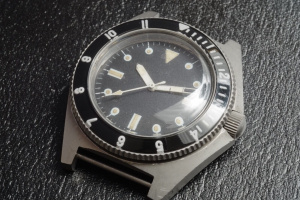Benrus Military Models: Difference between revisions
| Line 1: | Line 1: | ||
==Military Models== | ==Benrus Military Models== | ||
[[File:Benrus Type 1.jpg|thumb]] | [[File:Benrus Type 1.jpg|thumb]] | ||
Benrus has a long history of providing military watches to the US Government. From WW2 standard GI issues to specialist covert diver watches. | |||
===1940s=== | |||
===1950s=== | |||
===1960s=== | |||
The GGW-113 model is a popular one with collectors. | |||
Benrus closed out the 1960s by releasing two of the most iconic military dive watches of the era: the [[Benrus Type 1 - Sterile US Military|Benrus Type I]] and [[Benrus Type II]]. Developed to acquire a large military contract, these dive watches met the MIL-W-50717 specifications as outlined in the Type II figure below. | Benrus closed out the 1960s by releasing two of the most iconic military dive watches of the era: the [[Benrus Type 1 - Sterile US Military|Benrus Type I]] and [[Benrus Type II]]. Developed to acquire a large military contract, these dive watches met the MIL-W-50717 specifications as outlined in the Type II figure below. | ||
Revision as of 16:05, 9 June 2020
Benrus Military Models

Benrus has a long history of providing military watches to the US Government. From WW2 standard GI issues to specialist covert diver watches.
1940s
1950s
1960s
The GGW-113 model is a popular one with collectors.
Benrus closed out the 1960s by releasing two of the most iconic military dive watches of the era: the Benrus Type I and Benrus Type II. Developed to acquire a large military contract, these dive watches met the MIL-W-50717 specifications as outlined in the Type II figure below.
The case design was different from most watches of the time as Benrus opted for a “monocoque” case, meaning the case itself was all machined from one block of steel. In fact, the only way to access the movement is by taking the domed crystal, hands and dial off. This design allowed for the watch to be far more durable and increased the depth rating of the watch considerably. Finally, the fixed spring bars matched other military issued dive watches as they added security and removed a common weak point of dive watches.
The Type I and Type II became the military standard for the UDT (Underwater Demolitions Team), the predecessors to the Navy Seals, the Army and even the CIA. These watches today wear incredibly well and have a soft spot in the hearts of many collectors.
